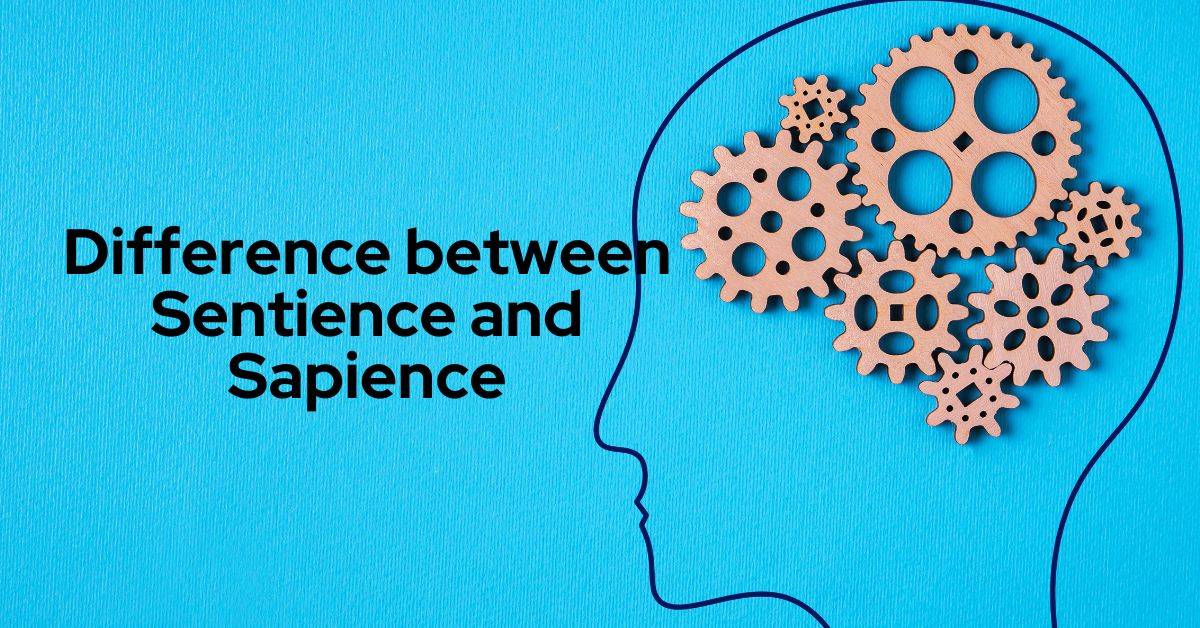What is Sentience?

Sentience is when a living being becomes aware of its surroundings and has feelings. A being is called sentient when it can feel the emotions, both good and bad emotions. In humans, this actually happens at a certain stage of life. However, brain damage can affect this ability sometimes like a human being can feel and be aware but with some changes.
Characteristics of sentient beings
A being is sentient if:
- They can show their feelings
- They can feel the touch sense, sight, smell, taste etc
- They react to what they sense, like noticing certain smells or sounds.
What is Sapience?

Sapience is the ability of the brain to use knowledge, experience or wisdom in making decisions.
Scientifically, sapience is a brain function that combines:
- Emotions
- Moral values
- Decision-making
- Creativity
But sapience is more complicated because humans are complex. For example, you might feel happy and think carefully before doing something. But when you feel angry, it’s hard to think clearly. Sometimes you are kind, and other times you might be rude.
What we know about sapience is that it’s always changing. It brings together different parts of who we are, helping us act in a way that sometimes works together smoothly, and other times not.
Characteristics of Sapience
- The ability to deduce ideas or meaning
- The ability to understand between right and wrong
- The capability or knowledge or skills to do something
The Nature of Sentience
Based on evidence from several studies, some animals can feel both positive and negative emotions like pain, joy, pleasure and anxiety. This means humans need to consider how we should treat animals. This is important for animal care and making laws that protect them.
It’s not that only birds and mammals are sentient. Research says that even fish can feel emotions, which was not believed before. There is still debate about whether creatures like crabs and octopuses are sentient.
However, the organization RSPCA already recognizes them as sentient. They believe laws should be made to protect them from extreme pain. For example, chefs should avoid boiling them alive and find kinder ways to cook them.
The sentience bill is currently in draft form, but some progress is being made.
Sentience in Artificial Intelligence
AI can become sentient if it achieves an empirical intelligence that enables it to feel emotions and have a conscience like humans.
The concept of sentient AI went viral when Google announced its first sentient AI, “LaMDA,” short for “Language Model for Dialogue Applications.” It is a chatbot that draws similarities with GPT-3 and BERT. Google claims that LaMDA comes integrated with trillions of words from the internet, and it can form sensible sentences and have open-ended conversations with users.
According to a 2022 report, the chatbot uses sophisticated language models that can take on different personalities. It can process millions of articles in seconds and come with authentic information and human-like discussions. LaMDA can show fear of being switched off or be conscious of death due to its personality-adaptation techniques. However, it is far from being a sentient AI.
The Essence of Sapience
Sapience is a behavioral and psychological construct that gives a glimpse of how humans make hard choices in life based on their wisdom and intelligence. However, wisdom is a trait that one can achieve only through aging. To implement wisdom, one needs to live longer and aggregate the combined knowledge one gained over a period.
Some believe sapience has an inherent capability to manifest wisdom, similar to how intelligence attracts knowledge. Whether a person can obtain sapience is based on several factors. One such factor is how they utilize their intelligence in real life. For example, if an intelligent person spends their whole life in a non-stimulating environment, they would never develop wisdom or sapience.
Sentience vs. Sapience: Key Distinctions
| Factors | Sentient | Sapient |
| Definition | It is a type of intelligence related to emotions, feelings and sensations. | It is an intelligence which comes from knowledge, wisdom, exposure and education. |
| Effects on education | How you feel about something or someone has little to no impact on your intelligence or education. | Sapience is deeply impacted by your education and experience you have received in your life. |
| Impact on Exposure | Your emotions are minimally affected by your exposure. For example, you can feel your presence or aliveness even within your room. | Exposure plays a significant role in sapience. |
| Effects on emotion | It depends on the type of emotion and the environment and culture. | Sapience is less affected by emotions. |
| Reasoning ability | Dependent on emotions and sensations | It depends on wisdom, experience and knowledge. |
In summary, both Sentience and Sapient are a kind of intelligence. Sentience revolves more around emotions, while sapience comprises wisdom and intelligence. Both can be judged on reasoning, judgment, decision-making, and relationship-building. In sapience, factors like education, exposure, and experience play a crucial role; whole emotions and personal values are essential in Sentience.
Frequently Asked Questions (FAQs)
Can an AI system be considered sentient?
The core values of Sentience revolve around consciousness (self-awareness) and the ability to express and show emotions. Although some AI can emulate human-like behavior and may even generate an emotional response to specific queries, they cannot be considered sentient. This is because the answers or responses of AIs are programmed through patterns and rules rather than genuine emotions or consciousness.
Are all animals sentient?
The primary school of thought was that humans are the only sentient being on the planet. Soon, more animals start to get added to the list. This includes vertebrates or creatures with spines, especially dogs, parrots, cows, pigs, and other domestic animals who can form companionship. Some studies also consider non-vertebrate animals, such as octopuses, squid, crayfish, crabs, etc., as sentient.
Can a being be sapient without being sentient?
Yes, it is possible for a being to exhibit advanced reasoning and cognitive skills without showing any form of sapience. The most prominent example is Artificial Intelligence.
Reference:
- lesswrong.com/posts/FhjwbQ3RfYeC6ZJWe/sentience-sapience-consciousness-and-self-awareness-defining
- faculty.washington.edu/gmobus/TheoryOfSapience/SapienceExplained/5.evolutionOfSapience/evolutionOfSapience.html
- science.rspca.org.uk/sciencegroup/sentience#:~:text=Evidence%20from%20multiple%20scientific%20studies,that%20matter%20to%20the%20individual.
- sciencedirect.com/topics/neuroscience/sentience#:~:text=Sentience%20means%20having%20the%20capacity,wide%20range%20of%20nonhuman%20animals.





